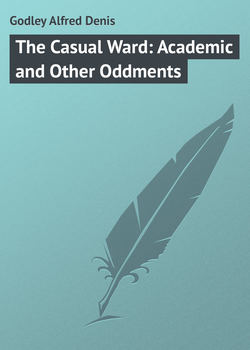Читать книгу The Casual Ward: Academic and Other Oddments - Godley Alfred Denis - Страница 4
THUCYDIDES ON THE INFLUENZA
ОглавлениеThucydides, an Athenian, wrote the history of the epidemic among the Oxonians, how they had the epidemic, having begun to write as soon as it broke out on No. 2 Staircase, and considering it to be the most noticeable of all that had appeared previously. (For the place was not liable to diseases at other times, but especially free from them, except that which affected the teeth: on account of which they used to go up to the metropolis, in word to consult the Delphic oracle but in deed to go to Olympia, so that not a few were banished from the city both for other reasons and not least this.) As to the causes of it, then, let any one speak who is aware of them: but I will show what things happened on account of it, having both myself put on an æger and seen others similarly afflicted, so that I can describe it with equal certainty more than the narrative of another not having done so, but relying on the incredibility of historians more than the sureness of experience.
For in the first beginning of the sickness men remembered what Homer says about the lower and higher animals in the Trojan business —
First did he assail the mules and fleet dogs, but afterward, aiming at the men his piercing dart, he smote, seeing that now too not less but equally as much first, the College Tutors were attacked, and next the scouts, and last of all the men themselves. But most of all the scouts were affected, and this caused the greatest calamity: so that a man must often wish that his scout might recover, wishing indeed contrary to nature, but being persuaded by the greatness of the surrounding misfortune, lest he should suffer even worse things at the hands of a scout’s boy, or considering it terrible if he shall lose even the daily enjoyment of his breakfast not being brought to him. And all laws concerning meals were brought into a state of confusion, so that many anticipated taking the commons of another. And they welcomed the hospitality of those outside the walls, regarding their hunger in the present as much more important than another man’s inability to pay his debts in the future.
But when the men themselves began to suffer, then indeed the disease was the commencement of lawlessness to a greater extent for the city. For cuttings of chapels and avoidings of lectures, which are an agony for the present more than a possession for ever, and in short all such things as the indulgence of was formerly more disguised, these a man easily dared to do, it being uncertain on the one hand whether his tutor has the influenza, and on the other if he himself might not put on an æger before being hauled he should pay the penalty. And though some, indeed, did things exactly contrary to this, and being before unaccustomed now went in the morning with a run to chapel in order that fewer being present the paradoxicalness of their appearance when compared with the multitude of those who were absent might gain them a prestige of virtue not real but simulated – yet with most there was now neither fear of the Dean by land nor by sea of their coaches: disobeying whom they ate and drank all kinds of things contrary to law, no one being willing to exert himself for that which seemed to be honourable, and calculating that the present abstention from pastry was not equivalent to the possibility of being bumped in the future about as much and not less than if he had smoked three pipes and a cheroot. And not only was injustice prevalent among those who were as yet in good health, but many of those in the ships, being or seeming to themselves to be sick, had their places taken by others accustomed rather to fight upon the land, whose manly inexperience, though in word more creditable than the cowardice combined with experience of the others, was in reality less powerful than the language which those on the bank thought worthy to use concerning them.
Nevertheless, about this time the Oxonians sent an expedition against Cambridge, having manned a slow train to Bletchley, Nicolaidas being commander second himself; and they advanced as far as Third Trinity, and having ravaged part of the land and set up a trophy, they returned home.
